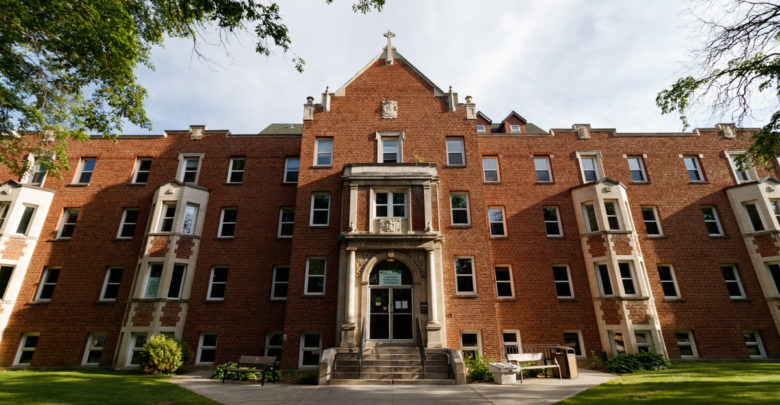Reaching a restructuring decision: Board of Governors rejects GFC recommendation, reinstates executive deans with some changes
The Board of Governors (BoG), the highest decision making body in the University of Alberta, has chosen to revise the recommendation of the General Faculties Council, reinstating an administrative restructuring model that includes executive deans.
 Christien Ford
Christien FordThe Board of Governors (BoG) — the highest decision making body in the University of Alberta — has overridden a recommendation from leaders in the University of Alberta community about how restructuring should unfold.
In a meeting on December 11, BoG unanimously agreed with the selection of a college model recommended by General Faculties Council (GFC) — the highest academic governing body. This model divides the university into a college of health sciences, a college of natural and applied sciences, and a college of social science and humanities, leaving Augustana, Campus Saint Jean, and the Faculty of Native studies independent. No timeline was given as to the implementation of academic restructuring.
Despite this agreement on an academic structure, the BoG ultimately revised GFC’s recommendation on administrative restructuring, voting 13-8 to include a new layer of administrative positions called executive deans.
Kate Chisholm, the chair of BoG, began the meeting by expressing her disagreement with GFC’s initial recommendation.
“I understand why adding three incremental well paid positions at the same time other positions are being eliminated seems uncaring and tone deaf,” she said. “I nevertheless believe that it’s absolutely in our best interest to have college deans to absolutely make sure that even worse things don’t happen to the U of A.”
During the meeting, the administrative structure recommended by GFC underwent the following revisions:
- Each college will be implemented by an executive dean instead of a service manager
- Instead of reporting to the provost, the executive deans will report to the council of deans of their respective college.
- The executive dean will be seconded, meaning selected from the pool of pre-existing faculty of deans to be sent to the position.
- The executive dean will be seconded by the faculty deans. Once appointed to the promoted position, the vacant faculty dean role will be backfilled.
This administrative structure will be reviewed by the president after 18 months.
Members of BoG emphasized the requirement for individual accountability, decision making authority, efficiency, and objectivity they believed the executive dean position would embody.
Dilini Vethanayagam, the GFC representative on the BoG, brought forward the revised motion after hearing these disagreements from BoG members.
“With the revised amendment we are looking to have more collegiality between the deans and they choose someone to be seconded to the elite dean role for next 12 months,” she said. “That compromises original motion that [the provost] had proposed to GFC but underscores underpinning of collegiality.”
Revisions were made to the motion during the meeting, changing the period of review from 3 years to 18 months, adding that the BoG would develop clear metrics to evaluate the administrative structure’s success.
Student representatives deny motion, remain in minority backing GFC recommendation
Notably, all BoG student representatives voted against the motion.
Marc Waddingham, president of the Graduate Students’ Association, raised concerns about how the motion would be perceived by the university community.
“We literally have the term college dean here which to many of our campus community is going to be perceived extraordinarily negatively,” he said. “… I think that GFC does have the right and the mandate to speak on this issue, and I worry about this workshopping on the fly, if that isn’t going to lead to a degree of damage down the road.”
Dave Konrad, the BoG representative for undergraduate students, asked for clarification on the motion but was ultimately unanswered.
“This really seems like an executive dean,” Konrad said. “The salary of this person seconded into the college position, will it be closer to $300,000? And when we think about backfill, an impact on the student experience, will we then be hiring sessionals for the professor that’s taken in to that dean role?”
Chisholm interjected when it was proposed that provost and vice president (academic) Steve Dew supply an answer.
“I think actually I’m just going to cut that one off a bit Dave,” she said. “Those are excellent questions but I don’t think the board needs to hear the answers to those questions… if we go into that level of detail I think we’ll be here until Christmas.”
Daniel Eggert, a public board member of the BoG and vice president of Melcor Developments, proposed an amendment to Vethanayagam’s motion at the end of the meeting. In his amendment, instead of reporting to the council of deans, the executive dean would report to the provost.
Donna Wilson, the academic representative of BoG and professor in the faculty of nursing, was in disagreement with Eggert’s amendment.
“I’m concerned about putting in an extra level,” she said. “We need each dean to hear the same information from the provost, not watered down from an executive dean or whatever you want to call these.”
Eggert’s amendment ultimately did not pass, with 5 in favour and 16 opposed.
Eggert questions collegiality of faculty deans
Earlier in the meeting, Eggert said he heard talk that faculty deans would not cooperate with an executive dean.
“If this is true that deans are either explicitly or implicitly threatening they will not cooperate with a college dean, then this strikes me as evidence that the culture of collegiality that’s required to be successful in the U of A for tomorrow plan does not currently exist,” he said.
Wilson disagreed with Eggert’s assessment of collegiality among deans.
“The deans are pretty capable people, and they are highly responsible,” she said.
Vethanayagam also took issue with Eggert’s statement.
“Going back to what Daniel said, this is not an antagonism issue at all,” she said. “It’s not just deans or faculty or support staff. We have a collegial governance model … we have done an enormous amount of work over the past 6 months … I think continuing in that form of collegial governance will help the whole academy.”




